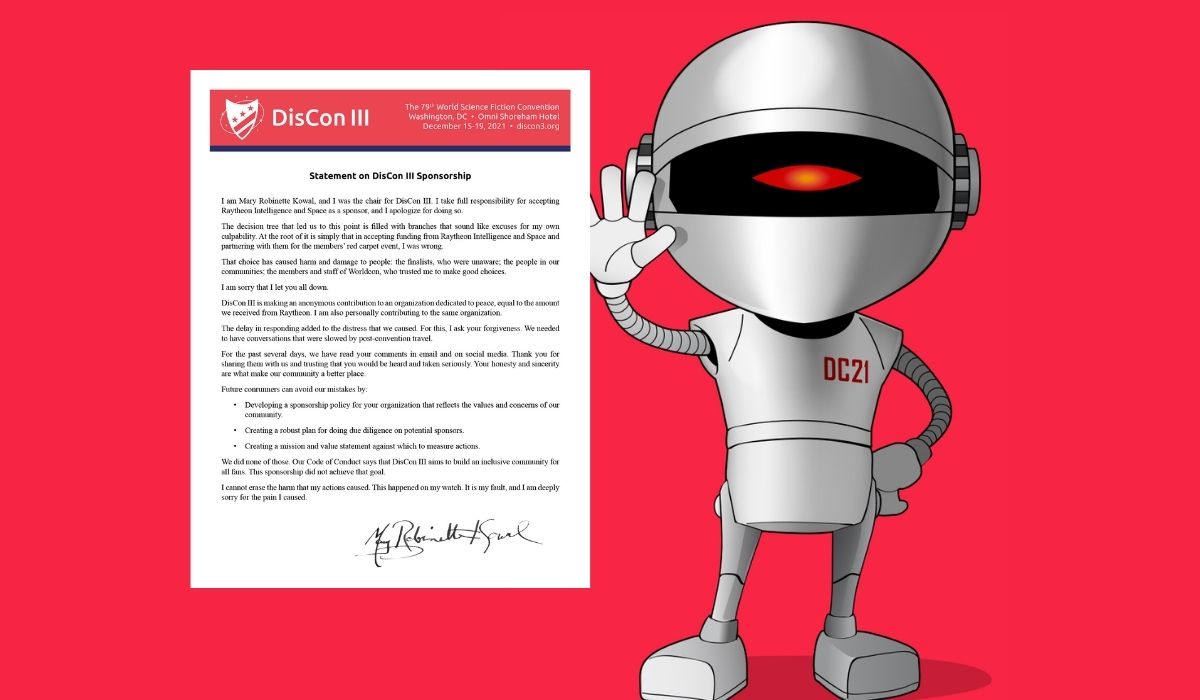Despite the continued successes of marginalized creators at this year’s Hugo Awards, the excitement for the awards soured as attendees learned that DisCon III and awards were sponsored by Raytheon. Raytheon is one of the five largest defense contractors in the U.S. and sells weapons and offensive (in the name of defense) technology to various governments and regimes.
While many expressed concern online and in person, it’s really hard to put into words and numbers how much devastation can be attributed to this private company. SFF writer and 2021 Hugo Awards nominee S.A. Chakraborty wrote on Twitter:
I am sitting here typing and deleting tweets, wondering which tabbed article referencing the gruesome deaths of children will be enough to keep the “all tech companies have some bad history” replies from coming…and honestly I don’t know what to say.
— Shannon Chakraborty (@SAChakrabooks) December 20, 2021
She was right about the defenders. Many were quick to come to DisCon’s (and even Raytheon’s) defense, citing the complicated history of science fiction and the military. We acknowledged it back in December and also discussed a bit broadly how the military (and defense contractors) partner up with entertainment entities outside of books to buffer their public image. And yet, people still make excuses.
While we agree that not all science-fiction has exactly been critical of the military or even fascism, its most memorable stories and sagas reflect on the human and environmental tolls of war. It also provides warning signs and gives space to explore the “what ifs” of the future, and the issues of the present through a new setting (similar to fantasy) as a form of both catharsis, entertainment, and to disarm preconceived notions.
Statement on DisCon III Sponsorship
Five days after the ceremony, Hugo award-winning author and DisCon III chair Mary Robinette Kowal put out an open letter addressing the controversy, apologizing, and taking full responsibility for the Raytheon sponsorship. She doesn’t address the steps leading up to the decisions (which is frustrating) but addresses this omission by stating that it will sound like an excuse.
This happened on my watch and is my responsibility. https://t.co/1DMxYhP917
— Mary Robinette Kowal@🏡 (@MaryRobinette) December 23, 2021
Kowal notes that DisCon III is donating an “anonymous contribution to an organization dedicated to peace, equal to the amount we received from Raytheon” and that she is also donating to the same organization.
This doesn’t really answer the questions asked as to what price was worth putting Raytheon as a sponsor. However, the DisCon Twitter account noted that the organization will remain private to prevent harassment by those upset people who voiced disgust and horror over Raytheon’s initial involvement at the convention. In many spaces online, the people that feel this way in the SFF or WorldCon are in the minority, but there are several that have already complained about this totally appropriate (and well written) apology.
Because we do not want them to get splashed with blowback from people who don’t think we should have apologized.
— DisCon III – The 79th Worldcon (@worldcon2021) December 23, 2021
Kowal’s apology advises future conrunners to develop a sponsorship policy that aligns with the communities values, create a research plan on potential sponsors, and design a “mission and value statement against which to measure actions.” She writes that DisCon III didn’t do that this time around, and the sponsorship conflicted with their code of conduct policy.
What’s stopping this from happening again?
In short, nothing will prevent a future WorldCon from taking a military defense contractor (or a straight-up military force) as a sponsor again. For one, organizations make mistakes, and history rhymes. Secondly, each WorldCon is managed by local chapters. The 2021 WorldCon was named DisCon III (DisCon for short) because it was the third time it was held in Washington, D.C.
While a decentralized approach to WorldCon has many pros and allows each event to be headed by those in that region, it’s also increased the visibility of its stacking issues. Just a few years ago, George R.R. Martin did the “old man yells at sky” for hours while defending old guards of science fiction and downplaying achievements of the Hugos’ big tent approach to fandom. Before and after that, there were similar issues handled to varying degrees by the committees.
What Kowal did after the backlash was the best route, but honestly, this will likely continue to happen if every year a different group is in charge and they can’t learn from each other in a more structured way. Changes can and will happen more easily when the leadership changes, but the will to address con and award issues that mirror real-world harm is a whole other thing entirely.
(via YouTube, image: DisCon III and Alyssa Shotwell.)
Want more stories like this? Become a subscriber and support the site!
—The Mary Sue has a strict comment policy that forbids, but is not limited to, personal insults toward anyone, hate speech, and trolling.—










Published: Jan 17, 2022 10:40 am